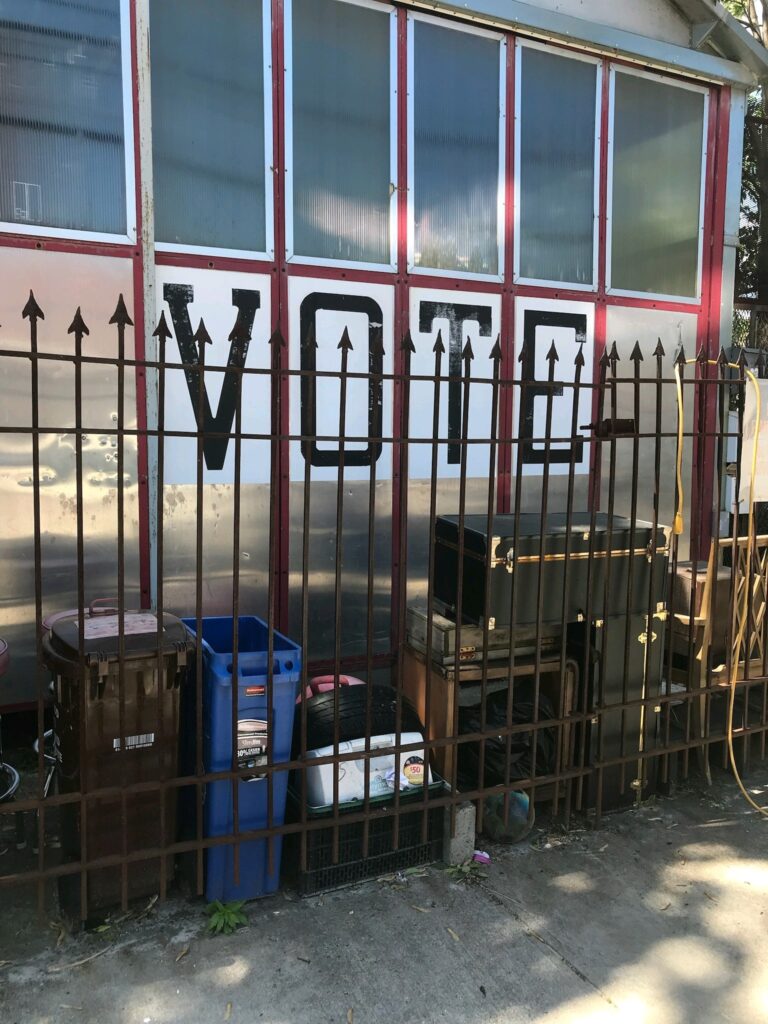Hoarding Power and Privilege in Duchy of Jersey

As expected, this last election voter turnout was abysmal and I suspect that in New Jersey, where elected officials have been known to look to get their family members into office, the power structure likes to keep it that way.
Heavy turnouts can be like an anxiety producing free radical for a system that has big money riding on outcomes that need to be pre-ordained and predictable. Millions in, billions out.
Leave it to social scientists, social justice advocates and members of the League of Women Voters to extol the virtues of broad based voter participation and how it might strengthen our democracy. Chances are if you make a living getting people elected your fine with a low turnout if it’s the voters you control.
“The right to vote is one of the most basic promises of our democracy,” explains the League of Women of Voters website. “In a democratic government, every person is considered equal and is empowered to both participate in their government and speak on the issues that impact their daily lives. Through our votes, we’re able to express our values around concerns like health care, climate change, criminal justice, taxes, and so much more.”
But that doesn’t really get at why voting is important and what the consequences are when large swaths of our fellow Americans sit it out and leave it often to a very narrow slice of the electorate. who for instance might insist that Trump won in 2020 or that the state has a right to second guess a woman’s reproductive choices.
HOARDING THE FRANCHISE
“Economic analysis that does not account for political power—who has it and how it is wielded—will inevitably fail to fully capture what keeps the United States from achieving equitable economic growth,” wrote the non-profit Washington Center for Equitable Growth, in their report The Consequences of Political Inequality and Voter Suppression for U.S. Economic Inequality and Growth. “ Those who enjoy market power are, not coincidentally, often the same citizens who enjoy outsized political influence, creating a feedback loop that perpetuates economic inequality, instability, and slow growth.”
The report documents how economic and racial inequality interact around the country among “those Americans who vote, those who try to vote but face obstacles in doing so, and those who do not vote altogether. The evidence-based research “pinpoints the myriad ways that economic and racial inequality together subvert our democracy by aiding and abetting political inequality and voter suppression.”
New Jersey’s voter disengagement clearly manifests in its poorer communities as homeownership declines, signaling a slide in political empowerment that experts say accompanies economic marginalization. And that’s evidently fine by Trenton’s existing power structure that’s only enriched by this feudal regression in a fractured society that used to promote home ownership as a way to uplift every community block by block.
Very often political insiders want to keep the bar low for entry into politics with the poor unwashed unpredictable masses as far away from the levers of power as possible. That way the well-oiled machine can ensconce the favored loved one into high office where they can continue to serve in office until they opt to retire, die, or are convicted of a crime. (In the Duchy of Jersey Indictments are NOT a disqualifier nor the mere possession of gold bars.)
In Jersey, as it was in England, privilege begets privilege. Garden state politics should be thought of as our version of the House of Lords, without the nobility. Just as our economic system is fixed to concentrate wealth at the very top, it also tends to hoard political power in the same rarefied circles or MetLife stadium suites.
TAKES MONEY TO MAKE MORE MONEY
It’s just who these folks in politics are comfortable with in a political system where millions are required to win a $49,000 seat in the legislature. And who in our society has that kind of discretionary cash to plough into such a narrow pursuit? The same wealthy corporate interests that like the Jersey wealth pyramid just as it is and even some that wouldn’t mind it steeper as long as they remain at the top.
This is the same Gold Dome Trenton crew who refused to give $100 million in hazard pay to thousands and thousands of economically struggling essential workers, who put their life on the line during COVID. This is the ruling class that spent hundreds of millions in federal dollars on pork barrel projects aimed at securing their own re-election.
As NJ Spotlight News reporters Colleen O’Dea and John Reitmeyer wrote as it was happening, Democrats divided up this federal “COVID-19 aid quickly and in private” with hundreds of projects large and small” getting “approved without public explanation.”
In the Duchy of Jersey, Rep. Andy Kim (D-NJ), a committed public servant, and Lawrence Hamm, a lifelong social justice activist, shouldn’t bother gathering signatures to get on the 2024 primary ballot for U.S. Senate, because New Jersey’s first family evidently has the claim on the seat. It’s a necessary accessory for the folks that already have everything.
In the Duchy of Jersey, to those that much has already been given, we heap on even more.
It’s how the wealth pyramid works. We like to keep our politics small and intimate so that it can be efficiently managed by the Bosses of the County Round Table. Like any organized enterprise, discipline is essential.
Tony Soprano knew that.
DIMINISHING RETURNS
This last election just little more than a third of Monmouth County’s almost 162,000 voters in the 11th legislative district participated in the Nov. 7th contest in which Sen. Vin Gopal (D) bested his Republican challenger. Using NJ ELEC’s $8.8 million preliminary price tag on the race, that would mean the total campaign for that seat cost a little over $157 per vote.
This year’s 55,852 11th district turnout was well below the 71,274 voters that turned out back in 2021 when Gov. Murphy was at the top of the ticket when statewide just 40 percent of registered voters turned out, one of the lowest turnouts for a gubernatorial election in decades.
As anemic as the turnout was in the Gopal race this year, it looks positively robust to the under 9,000 who voted this year out of the 111,715 voters on the rolls in Sen. M. Teresa Ruiz’s 29th district in Essex County, where she prevailed.
This year, in Sen. Joe Cryan (D) ‘s successful race in Middlesex County’s 20th district just over 16,000 voters bothered to turn out of the 130,022 on the rolls.
Does that bother incumbents?
Consider the spectacular arc of the young Bob Menendez Jr., the son of three times indicted Sen. Robert Menendez (D-NJ) who was anointed in 2022 to run for his father 8th district seat which includes almost all of Hudson County as well as small portions of Essex and Union counties. In that election, just 29 percent of Hudson County’s eligible voters turned out. Essex wasn’t much better at 32 percent and even Union’s 39 percent fell below the state’s 41 percent overall average.
When you cross reference New Jersey’s county by county voter turnout numbers with the United Way’s latest ALICE report, which tracks the state’s economically struggling households, you’ll notice the counties with the highest percentages of struggling residents also lag significantly in voter participation. The ALICE analysis, which was first created by the United Way of Northern New Jersey, takes a detailed look at what it takes a family to get by factoring in the local costs for rent, childcare, utilities, fuel, and other basics. The acronym ALICE stands for asset limited; income constrained but employed.
ALICE families live above the official poverty line but struggle week to week to cover the basics. In New Jersey, 68 percent of the population under 25 is either living below the official poverty line or that ALICE threshold. Over half of the state’s Black and Latino households fall into that crucible, which was also disproportionately hit by COVID.
There’s thousands of ALICE households that include the kind of essential workers like security guards whose families could have really used what would have been a one time $1,000 shot in the arm.
Statewide, 37 percent, or 1.3 million households are poor or struggle week to week to get by. In Cumberland County, by some measures the state’s poorest, it’s 56 percent in that circumstance and in the last federal election just 33 percent of that county’s voters bothered to vote.
The trend holds when looking at Hudson, Essex, and Passaic counties where voter turnout Is well below the state average but economic hardship is far more common than in the wealthier counties where voters are also more engaged perhaps because they have something to protect.
Even in 2020, when the nation set a record for the number of voters casting a ballot, only 49 percent of Newark’s voters turned out. By 2021, with Governor Murphy at the top of the ticket, just 20 percent bothered to turnout in the state’s biggest city.
In 2018, Council President Luis Quintana just needed to garner 17,000 votes to win his at large Council seat, just about ten percent of the registered voters. In the South Ward, John Sharpe James claimed victory with just 3,000 votes.
For a few years now, researchers have linked a marked decline in Black homeownership, in the aftermath of the 2008 Wall Street sparked mortgage crisis, with a decline in Black voter turnout. In 2016, Donald Trump carried states like Pennsylvania and Michigan, thanks in large measure to 800,000 Black voters who turned out for President Obama in 2008 and 2012 just staying home for the Trump vs. Clinton contest.
While 72.7 percent of white Americans own their own home, Black home ownership is at 44 percent, a gap that helps explain the widening racial household wealth gap that’s now about ten to one.
According to a 2020 research paper by Brigham Young University sociologist Jacob S. Rugh there’s a strong link between homeownership and voter participation that’s clearly evident here in New Jersey.
“First off, it’s easier to vote if you stay at the same address as homeowners do, more likely than renters,” Rugh told KUER, the NPR affiliate in Utah. “Second, it’s easier to vote when you have more resources and more time. And third, it’s more likely that homeowners vote because voting, like any measure of civic participation, such as writing a letter to an official or participating in a protest, corresponds to more resources such as income, education, and wealth in the form of home equity or your home value.”
WHEN YOUR HOUSE IS NOT YOUR HOME
Across New Jersey, as wealth concentration continued to accelerate across the country, an increasing number of LLCs bought up single family homes that were once owned by families with the Asbury Park Press reporting a 500 percent increase in such purchases between 2012 and 2021, from 12,000 to more than 72,000.
This 21st century revival of tenant serfdom in New Jersey is particularly pronounced in Newark where a Rutgers University study showed that close to half of all of its homes are owned by corporations, “a model designed to enrich investors through returns from rent collections….that can displace residents and ownership.”
According to Propertyshark.com, Newark has the lowest rate of homeownership at just 23.2 percent of the nation’s 75 largest metropolitan statistical zones.
“The Rutgers Center on Law, Inequality and Metropolitan Equity (CLiME) found the city had the highest rate of corporate buyers in the nation, although numbers are rising throughout the country,” according to a press release issued with the report. “This is especially true in mostly Black neighborhoods, like Newark’s South and West Wards, where corporate property ownership is most prevalent.”
Of the 2,500 homes sold in Newark between 2017 and 2020, “more than 47 percent of the city’s one-to-four unit buildings – were sold to institutional buyers” who were often “completely anonymous investors”, hence the title of the Rutgers’ report, Who Owns Newark? Transferring Wealth from Newark Homeowners to Corporate Buyers.
“Sadly, this reality continues a long pattern of economic threat to predominantly Black and increasingly Latino neighborhoods in a state whose communities are among the most segregated in the country,” the report states. “From racial exclusion to predatory lending, from foreclosure to the extraction of rents, Newark’s experience demonstrates what can happen when local economies ignore equity.’’
“These trends demonstrate the strong probability of rapidly rising rents, lower homeownership rates, a diminished Black middle class, market challenges to building affordable homes, and even more housing instability for low- and moderate-income Newarkers and displacement,’’ according to the report.
Professor David D. Troutt, a distinguished professor of Law and Justice John J. Francis Scholar as well as the founding director of the Rutgers Center on Law in Metropolitan Equity, contributed to the home ownership analysis.
The Rutgers’ report notes that home ownership is the way that wealth gets transferred between the generations as it helps to provide stability as well as enhanced public safety, all of which re-enforces “neighborhood autonomy.”
“Traditionally, Americans believed homeownership to be the individual path to collective security,” Troutt said. “Corporate buying up of the residential market forecloses all of that.”
As we have seen, as homeownership declines in our poorest communities so does political engagement and that can have national and historical consequences.
There’s been a lot of post Jan. 6 rhetoric from Democrats about the clear and present danger presented to our democracy by the unrepentant MAGA Trump Republicans who drove the violent insurrection. But here in New Jersey, as well as in New York, it was the Democratic Party’s failure in 2022 to excite their voters to turnout that helped paved the way for the loss of the House.
It was Tom Kean’s (R-NJ) win over Tom Malinowski in the 7th , along with the four Democratic House seats Republicans successfully flipped in New York state, that made it possible for Rep. Mike Johnson (R-LA), who led the charge in 2020 to NOT certify President Biden’s electoral victory. He’s now third in the line of succession to the presidency.
It’s only natural that Jersey Democrats take a victory lap for the most recent election which produced a pickup in the State Senate and five seats in the Assembly after losing seats in 2021. But if this year’s abysmal turnout is any guide, they have an awful lot of work to do if they really want to make any real contribution to the Democrats taking back the House of Representatives.
Compare New Jersey and New York’s lackluster 2022 performance with Democrats in Michigan and Pennsylvania who saw some of the highest turnout rates in the nation producing big wins up and down the ballot.
KEEPING AMERICA’S PROMISE
If professional Democrats are really concerned about a Trump restoration or the continued control of the House by an avowed 2020 election denier, they need to engage the tens of millions of low-income voters that Rev. Dr. William Barber describes as the “sleeping giant”. A key piece of that is embracing the American labor movement.
Out of the 168 million voters who cast a ballot in the 2020 general election 58 million were poor or low-income voters, according to research compiled by Rev. Barber’s Poor People’s Campaign: A National Call for Moral Revival. “This means that more than one-third of the voting electorate—35 percent—were low-income voters,” according to the PPC: NCMR report issued earlier this month. “There were another 22 million low-income voters who were registered, but did not vote, meaning that out of the 215 million registered voters in 2020, 80 million—or 37 percent—were eligible low-income voters.”
“At the same time, the significance of the low-income electorate is about more than winning elections,” according to the Poor People’s Campaign: A National Call for Moral Revival. “The concerns of these voters are widely popular, yet far from being fully implemented. Instead, 140 million people are poor or living one emergency away from economic ruin, while the wealth and abundance of the country becomes concentrated in fewer and fewer hands. In addition, the democratic rights of the people are under attack with voter suppression laws.”
According to PPC: NCMR’s state-by-state analysis of the 1.4 million registered low-income voters in New Jersey, just over one million voted, meaning that close to 400,000 sat out the 2020 election.
But of course, you would have to engage these voters by actually addressing their needs and concerns and, as we saw with the hazard pay bill, for an awful lot of incumbents in Trenton that’s outside their comfort zone.
What’s the point of being in power if you are not comfortable?










Why are there 140 MILLION Americans at or near poverty and one emergency away from economic ruin? Don’t blame the wealthy. The make the jobs. You have to blame the government for our ever increasing taxes. Cutting federal income taxes by 75% or eliminating it altogether and using a flat tax of 15% that can never be changed or sunsetted, will allow all Americans to prosper and live a normal life without having to worry about where the next paycheck comes from.
Really? No. The billionaires and millionaires must pay taxes, then lessen the payroll taxes.